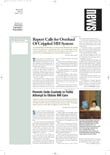In early June I took a phone call from a reporter wanting to talk about the HIPAA privacy regulations. “Why,” he asked, “the current flurry of activity? Where has APA been on this issue? After all, the regulations had been in the making for the last seven years, and yet psychiatrists seemed desperately unprepared for the April 14 deadline. Why did this seem to come as such a surprise?”
Surprise? Unseen, I rose from my chair with suppressed indignation. What has APA been doing! APA has been arguing for the cause of privacy since the regulations first began to be created. We’ve marched over to meet with Donna Shalala when she was secretary of Health and Human Services (HHS) and again with her successor, Tommy Thompson. Richard Harding, Paul Appelbaum, Paul Mosher, representatives of a number of our allied psychiatric organizations, and I have been on the Hill testifying before the Senate, House, and related committees. Hours have been spent by APA’s Division of Government Relations (Nancy Trenti deserves particular thanks) informing, watching, and persuading. APA’s Committee on Confidentiality worked with intensity and diligence to produce the fact-filled brochure “Compliance Materials for HIPAA Privacy Rule,” which is available to all members in the “Members Corner” section of APA’s Web site at www.psych.org. It provides information about the HIPAA privacy rules, policies, and procedures and a “minimum necessary” guideline. There is also an open forum on the Web, with legal expertise available to answer members’ questions. Psychiatric News has printed numerous articles on the privacy rule in news articles as well as “how to comply” articles.
What have we been doing? We’ve poured our heart and soul into this issue! We succeeded in gaining the inclusion of informed consent under President Clinton only to have it dropped under President Bush. We are engaged against the most powerful lobbying groups that there are, including the insurance industry, hospitals, and software companies.
Well, I simmered down and managed to laugh while saying, “Look, how many people are in line at the post office the night before April 15? They have known all year about the deadline for filing their income tax, and yet there they are on the night of April 14 unprepared but going right down to the last minute to meet the deadline.” The choice of April 14 as the deadline for compliance with the HIPAA privacy regulations was an interesting and ironic choice of timing.
With all of our efforts, where have we ended up? As the reporter said, “Does this add anything positive to clinical care?”
There is one positive gain. Psychotherapy notes are afforded special protection. Psychotherapy notes are defined as “notes recorded. . .by a health care provider who is a mental health professional documenting or analyzing the contents of conversation during a private counseling session or a group, joint, or family counseling session.” Access to these notes, placed in a separate part of the chart, is specifically forbidden without the patient’s explicit permission. Authorizations many not be compelled as a condition of health insurance payment or provision of services.
What have we lost that we must fight to regain?
The facts are that when patients walk in the door, they must be given a notice that describes all of the legal uses and disclosures of their medical information. Unless the physician opts to do otherwise, that is the last time the patient signs a form to release his or her medical information. (It is important to keep in mind that although the law states otherwise, the APA Principles of Medical Ethics requires that we obtain a patient’s express consent before we make certain disclosures about the patient’s personal health information.)
We are lobbying vigorously for the Markey bill (Stop Taking Our Health Privacy [STOHP] Act of 2003, HR 1709), which restores informed consent. This bill also argues against a damaging feature of the HIPAA privacy rule, slipped into the rule at the last minute—the release of patient information for marketing purposes.
There’s the challenge for today! Call your legislators and urge them to support HR 1709. Look on APA’s Web site at www.psych.org and download all the necessary information. Go to the “Members Corner” section and look at the questions your colleagues have asked and raise your own questions.
We have been embroiled in the fight to preserve patients’ privacy for years. The fight is not over, and we will not let it die. ▪

